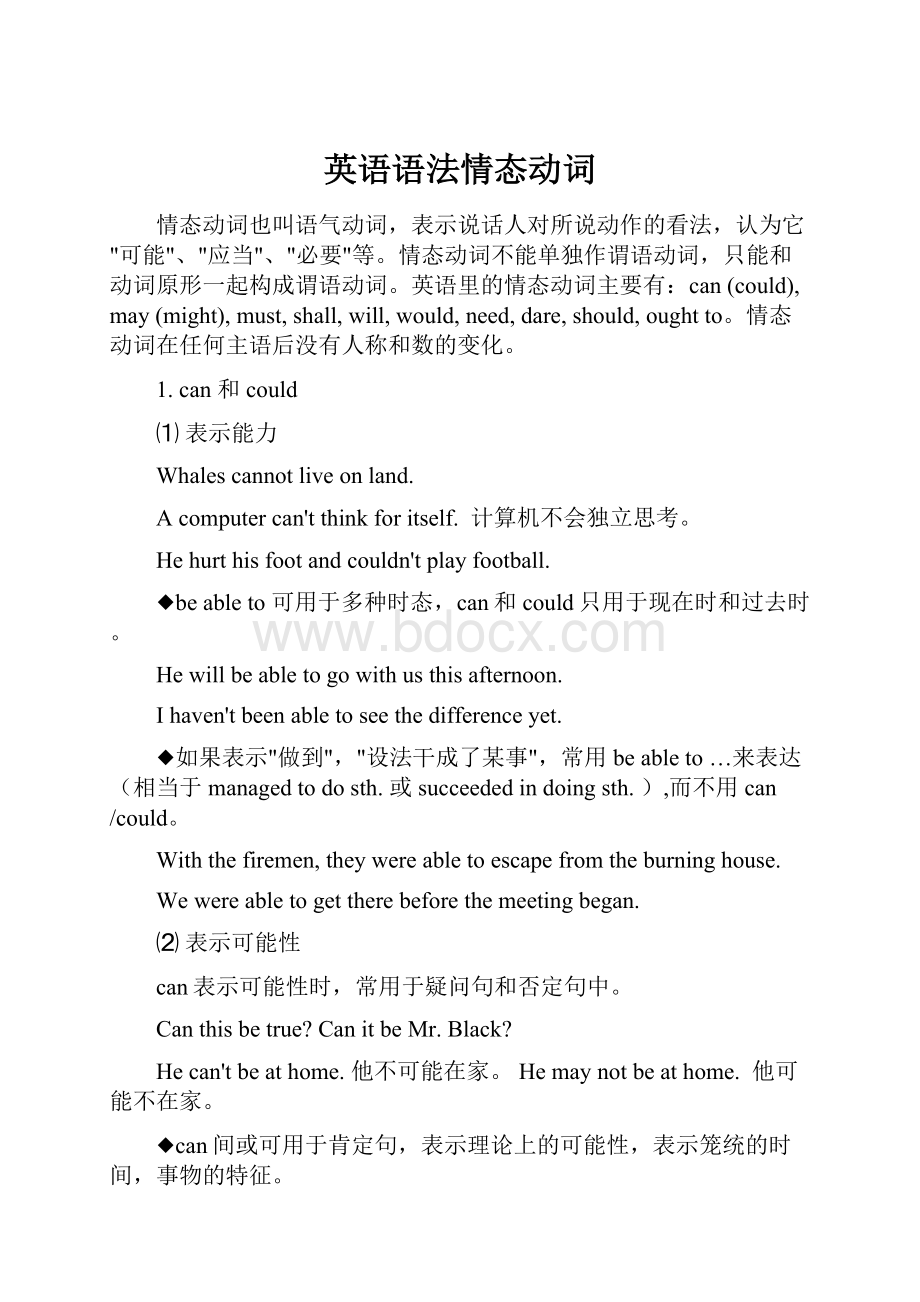英语语法情态动词.docx
《英语语法情态动词.docx》由会员分享,可在线阅读,更多相关《英语语法情态动词.docx(15页珍藏版)》请在冰豆网上搜索。

英语语法情态动词
情态动词也叫语气动词,表示说话人对所说动作的看法,认为它"可能"、"应当"、"必要"等。
情态动词不能单独作谓语动词,只能和动词原形一起构成谓语动词。
英语里的情态动词主要有:
can(could),may(might),must,shall,will,would,need,dare,should,oughtto。
情态动词在任何主语后没有人称和数的变化。
1.can和could
⑴表示能力
Whalescannotliveonland.
Acomputercan'tthinkforitself.计算机不会独立思考。
Hehurthisfootandcouldn'tplayfootball.
◆beableto可用于多种时态,can和could只用于现在时和过去时。
Hewillbeabletogowithusthisafternoon.
Ihaven'tbeenabletoseethedifferenceyet.
◆如果表示"做到","设法干成了某事",常用beableto…来表达(相当于managedtodosth.或succeededindoingsth.),而不用can/could。
Withthefiremen,theywereabletoescapefromtheburninghouse.
Wewereabletogettherebeforethemeetingbegan.
⑵表示可能性
can表示可能性时,常用于疑问句和否定句中。
Canthisbetrue?
CanitbeMr.Black?
Hecan'tbeathome.他不可能在家。
Hemaynotbeathome.他可能不在家。
◆can间或可用于肯定句,表示理论上的可能性,表示笼统的时间,事物的特征。
Anybodywhowantstotrycanbesuccessful.只要想试,任何人都可能成功。
ScotlandcanbeverywarminSeptember.
⑶表示许可和请求
在日常生活中,can可以代替may,表示"允许";could可以代替can,但语气较为婉转。
Can/CouldIuseyourpen?
Yes,ofcourseyoucan.(不能用could )
No.I’mafraidnot.
⑷习惯短语:
cannot…too… 越…越好Youcannotbetoocareful.
cannotbut 不得不Icannotbutdoso.我不得不这样做。
⑸can和could后面接动词的完成式,表示对过去情况的猜测或判断。
can常用于疑问句和否定句,could用于肯定句,表示一个非事实的或不可能实现的可能性。
Wherecanhehavegone?
Hecan'thavegonetoschool.----It'sSunday.
Youwerestupidtogoskiingthere.Youcouldhavebrokenyourleg.
⑹couldhavedone本来能做而实际未做,表达遗憾的感情色彩
----IstayedatahotelwhileinNewYork.
----Oh,didyou?
YoucouldhavestayedwithJane.
2.may和might
⑴表示允许
might比may语气更客气、更委婉
Youmaytakearestnow.
May/MightItakethebookoutoftheroom?
No,youmustn't/maynot/cannot.
Sure/Certainly/Ofcourse
否定用于拒绝给予许可,或禁止做某事。
通常在官方公告中。
Studentsmaynotstayoutaftermidnight.学生午夜后不得在外逗留。
⑵表示可能性
常用于肯定句和否定句,指说话人的猜测。
might指把握性不大,
Hemay/mightcome.You'dbetterstayhereforamoment.
Imay/mightnotbebackfordinner.(I'mnotsurewhetherI'llbeback.)
may强调逻辑上的可能。
can强调事实上的可能。
Helookspale.Hemaybeill.他脸色苍白,可能有病。
Heisinpoorhealth.Hecanbeillatanytime.他体质很差,任何时候都有可能生病。
(3)may/might+have+过去分词
表示对过去的推测,认为过去可能发生的动作。
may比might的把握性更大
Hemay/mighthavegoneabroad.
Hemay/mighthavehadsomekindofaccident.
(4)用于祈使句,表"祝愿"
Mayyoubothbehappy!
Mayyousucceed!
(5)习惯用语:
may/mightaswell 还是…的好
Youmayaswellgivehimtheletter.Imightaswellstayathometonight.
(6)在表示目的状语从句中构成谓语
Writetoheratoncesothatshemayknowintime.
Hediedsothattheothersmightlive.
3.must
⑴表示"必须"、"一定"(现在和未来)
MustIgetreadynow?
Wemustfinishthisbeforehecomes.
⑵must和haveto:
must表示说话人主观认为的"必须",而have/hasto表示客观的需要,译为"不得不"
Ireallymuststopsmoking.(我认为应该戒烟)
Ihavetostopsmoking.(客观情况使我戒烟)
◆haveto有时态和人称的变化,而must没有
Ihadtowritesomeletterslastnight.
IwillhavetomeetMr.Edwardatthreeo'clockthisafternoon.
◆mustnot=mustn't 表示“禁止”,donothaveto=don'thaveto表示"不必"
Youmustn'tgonow.Youdon'thavetogonow.
MustIhandinmypapernow?
Yes,youmust.(No,youneedn't./No,youdon'thaveto.)
⑶表示判断推测
◆暗含很大的可能性,must仅用于肯定句,不能用于疑问句和否定句。
Theymustbeintheclassroomnow.Youmustbeill.Youlooksopale.
◆must+have+过去分词 表示对过去事情的推测。
Theymusthaveheardthenews.Somethingmusthavehappened.
Thegroundiswet.Itmusthaverainedlastnight.
⑷must用在反意疑问句中
HemustworkhardatEnglish,mustn'the?
Youmustrenewthebook,needn'tyou?
Hemustbeateacher,isn'the?
(不说mustn't)
YoumusthavestudiedEnglishformanyyears,haven'tyou?
(不说mustn't)
Hemusthavearrivedhereyesterday,didn'the?
(不说haven't)
⑸must表示"偏偏"
Thecarmustbreakdownjustwhenwewereabouttostartoff.
我们正要出发时偏偏车又坏了。
4.will和would
⑴表意愿、决心在陈述句或在条件状语从句中。
Iwillneverdoitagain.
IwillfinishmylessonevenifIhavetostayupallnight.
即使我整夜不睡觉我也一定要把功课做完。
Ifyouwillallowme,I'llgowithyou.如果你愿意的话,我将跟你去。
⑵would可表示过去的习惯动作
Hewouldsitthereforhourssometimes,doingnothingatall.
EverymorningIwouldgoforalongwalk.
⑶表示询问对方的意愿或向对方提出请求,would比will的语气更婉转
Willyoupleasepassmethemagazine?
Sure/Certainly。
Won'tyoucomeover?
请到这边来好吗?
⑸will可以表示现在或当前的习惯性、经常性、倾向性。
常译成"惯于"、"总是"
Oilwillfloatonwater.油浮在水面上。
Nomatterwhatyousay,hewillalwaysarguewithyou.不管你说什么,他总是和你争论。
Awisemanchangeshismind,afoolneverwill.聪明人能随机应变,傻瓜是不会的。
Waterwillboilat100℃.水在摄氏100度时总是要沸腾的。
Thedoorwon’tshut.
(6)表示可能
表示说话人对将来和现在的预测。
对现在的预测认为肯定会发生。
Ithinkhewillbeallrightnow.我想他现在一定好了。
Thatwouldbehismother.那肯定是他母亲。
5.shall
⑴用于第一、第三人称疑问句,表示说话人征询对方意见或请求指示
WhereshallIputmybag?
Shallhecomeinorwaitoutside?
⑵用于第二、第三人称,表示意愿、期望、允诺、命令、强制、警告、威胁等语气。
Youshallkeepyourroominorder.(表命令)
Heshallbesorryforitoneday,Itellyou.(表警告)
Heshallgethismoneyifhetellsthetruth..(表允诺)
Nooneshallstopme.不许任何人阻止我。
(表意志和决心)
shall在条约,规章和法令等文件中,表示义务和规定。
Eachplayershallwearanumber.每个运动员必须带上号。
ThenewregulationshalltakeeffectonOct.1st.新章程十月一实施。
(3)表示说话人的猜测,估计应该
Ishallberichoneday.总有天我会发财的。
ThatshouldbeJanetcomingupstairsnow.正在上楼的准是珍妮特。
6.should
⑴表示责任、义务、建议、劝告,用于各人称。
Youshouldn'tjudgeamanalwaysbytheclothes.你不应该总是以貌取人。
Youshouldalwaysthinkofothersbeforeyourself.(表劝告)
⑵表推测、可能,暗含很大的可能。
Ithinkheshouldbehomenow.
Youshouldknowhisaddress.
⑶should/oughtto+have+过去分词 表过去本应完成而未完成的动作
shouldn't/oughtn’tto+have+过去分词 表示过去发生了不应发生的动作
Heshouldhavearrivedbythistime.(其实未到)
Youshouldn'thavemadesomuchnoise.(事实是吵了)
⑷用在why,how开头的疑问句中或that引导的从句中。
表达说话人意外和不满,"竟,竟会"
Whyshouldyoubesolate?
为什么你竟这么晚?
HowshouldIknow?
我怎么会知道?
I'msorrythatyoushouldthinksobadlyofme.你竟把我想得那么坏,我感到遗憾。
(5)用在if引导的条件状语从句中,表示“万一”。
Askhertoringmeupifyoushouldseeher.
Ifyoushouldchangeyourmind,pleaseletmeknow.
(6)用于建议、命令、要求等的从句中,构成虚拟语气
Wedemandedthatourwagesshouldberaised.
Itissuggestedthatheshouldgotherebyair.
Mysuggestionisthatweshouldsendafewpeopletohelpthem.
7.need和dare
⑴need作情态动词,表示"需要",用于否定句和疑问句中,无人称和数的变化。
Weneedn'tgotheretomorrow.NeedItellyouallthedetails?
⑵dare作情态动词,通常用在否定句和疑问句中,无人称和数的变化。
Hedarenotdoso.Idarenotstandonthechair.
Howdareyousaysuchathing?
你怎么敢说这种话?
⑶need和dare也可作行为动词,与一般动词的变化相同。
DoIneedtotellyouallthedetails?
Itneedstobedoneatonce.
Youdon'tneedtoworryaboutthat.
dare在否定句中有时带to,有时不带to。
Hedidnotdare(to)doso.
⑷习惯用语:
Idaresay 表示"我想"、"大概"。
There'ssomethingwrongwiththeradio,Idaresay.
Idaresayyouareright.
⑸needn't+have+过去分词
表示过去本来不必做某事而实际上做了,"本不必做…"
Youneedn'thavecome.(=Youdidn'thavetocome.)(事实上你来了)
Heneedn'thavewaitedforme.(=Hedidn'thavetowaitforme.)(事实上他等我了)
表示推测的情态动词用法归纳:
肯定句;
⑴对当前行为、情况或状态的推测:
must/may/might/could+do/be
语气的肯定程度依次递减。
其中,might和could并非过去时态,只是语气较为委婉或可能性较小
Hemust/may/might/couldbeinthereadingroom.他肯定/可能/也许在阅览室里。
Imustlookfunnyinthishat.我戴这顶帽子看起来一定很滑稽。
⑵对此时此刻正在进行的动作的推测:
must/may/might/could+be+doing
Hemust/may/might/couldbewatchingTVatthistime.他此时一定/可能/或许在看电视。
Theymustbewaitingforus.
⑶对过去发生的事情的推测:
must/may/might/could+have+过去分词
Theymusthavearrivedbynow.
Youlookverytired.Youmusthavestayeduplastnight.
Youmayhavereadaboutitinthepapers.
⑷过去的一段时间内一直在进行的动作:
must/may/might/could+have+been+doing
Theyaresweatingallover.Theymusthavebeenworkinginthefields.
他们浑身是汗,准是在地里劳动来着。
Hemayhavebeenwaitingforusforanhour.他可能等我们一小时了。
否定句:
can/couldnot 不可能,想必不会may/mightnot 可能不
⑴对当前行为、情况或状态的推测:
Hemaynotbebusynow.也许他现在不忙。
Hecannotbebusynow.他现在一定不忙。
Hecan'tbeinthereadingroom.Isawhimontheplaygroundjustnow.
他不可能在阅览室里,我刚看到他在操场上。
⑵对此时此刻正在进行的动作的推测:
Theycan'tbetellingthetruth.他们不可能在说真话。
Theymaynotbetellingthetruth.他们可能没在说真话。
⑶对过去发生的事情的推测:
Hecan'thavefinishedtheworksosoon.这项工作他不可能完成得这样快。
Hemaynothaveachievedallhisaims.Buthiseffortisagoodone.
他可能没达到他的全部目的,但他还是认真做了努力的。
⑷过去的一段时间内一直在进行的动作:
Hecan'thavebeenwaitingforussolong.他不可能等我们那么长时间。
疑问句中:
常用can/could来表示说话人的猜疑、怀疑或不肯定的语气
Wherecanhebenow?
他现在会在哪里呢?
Canitbetrue?
那会是真的吗?
It'ssolate.CanTombereading?
这么晚了,汤姆还在看书吗?
Whatcanhebedoing?
他可能在做什么呢?
Canshehavetoldalie?
她会不会说谎了?
Wherecanshehavegone?
她会上哪儿去了呢?
Multiplechoice
1.Wehaveplentyoftime.We_______runsofast.
A.mustn't B.needn't C.haveto D.must
2.Where_______mysisterwaitforyou?
Intheclassroom?
A.need B.shall C.may D.can
3._______youpleasetellmethewaytothelibrary?
A.Would B.Should C.Must D.Need
4.Hedidn'tgotothelibrarylastSunday,orI_____him.
A.wouldsee B.couldmeet C.mighthaveseen D.mightsee
5.----Doyouhavetoleavenow?
----I'msorry,butIreally______.
A.can't B.have C.should D.must
6.Theclassroomisempty.They_____bereadingtherenow.
A.mustn't B.can't C.must D.should
7.----Remembertoattendthemeeting.----I___________.
A.do B.will C.can't D.would
8.----Iwaswaitingforyouthistimeyesterday.
----Sorry,I_______youtotellyouthatIcouldn'tcome.
A.musthavecalled B.wouldhavebeencalling
C.couldhavebeencallingD.shouldhavecalled
9.We______nottomakesomuchnoiseinthelab.
A.need B.dare C.can D.ought
10.You_____havecomehereyesterday,______you?
A.mustn't,didB.couldn't,hasC.must,haven'tD.must,didn't
11.WheneverIwasnotathome,mychild______watchTV.
A.will B.would C.wereto D.weregoing